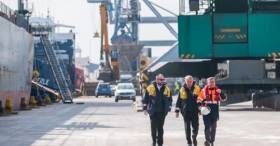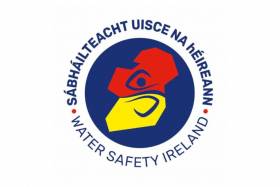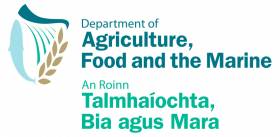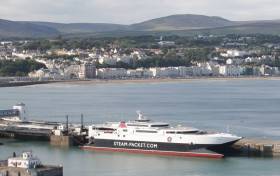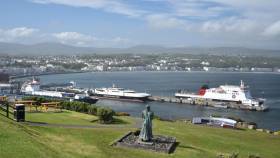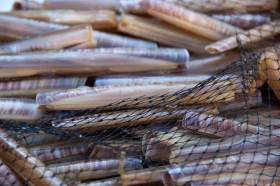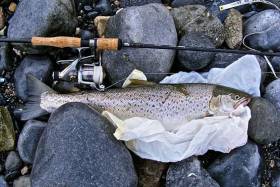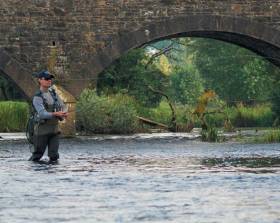Displaying items by tag: Public Consultation
On the southern tip of County Kilkenny is located the Port of Waterford which is beginning a public consultation process seeking inputs from all stakeholders on a proposed master plan setting out how the port could develop over the 25-year period to 2044.
As the Kilkenny People writes, the port company's draft masterplan outlines various demand scenarios that will determine capacity requirements at the port. The intention is that the masterplan will provide a framework for development and position the port to respond to emerging trends and opportunities.
The first consultation sessions will be held on the 4th floor of the Marine Point office development in Belview, County Kilkenny at 11:00 and 14:30 on Wednesday, 26 June.
A further session will be held in the Passage East/Cheekpoint area of County Waterford on 18 July with the time and venue to be posted on the port’s website once confirmed.
Click here for more on the master plan.
Water Safety Ireland Launches Consultation On Regulatory Guidelines Following Tragic Drowning Incident
Water Safety Ireland is seeking the views of the public on a draft regulatory framework for aquatic leisure facilities in Ireland.
Following the inquest on 29 March 2017 into the tragic fatal drowning of Ronan Kennedy at the Red Barn Quality Hotel in Youghal on 14 July 2015, the Dublin Coroner made two crucial recommendations to former Minister for Housing, Planning, Community & Local Government, Simon Coveney:
- That there should be a dedicated lifeguard on duty at all times at swimming pools and that the lifeguard should not be a person engaged in other supervisory duties; and
- To recommend to the relevant minister that a dedicated water safety inspectorate is required to formulate regulations and ensure their implementation.
Minister Coveney tasked Water Safety Ireland to review best practice in other European countries with a view to informing the development of an appropriate regulatory framework for Ireland.
Water Safety Ireland says it believes this can be a legacy that will turn this tragic drowning in to a positive regulatory framework that will help prevent similar tragedies in the future, to be known as ‘Ronan’s Regulations’.
Details of the public consultation are available on the Water Safety Ireland website HERE.
Public Consultation On Quota Balancing Scheme For Demersal Fish Stocks
#Fishing - Marine Minister Michael Creed has launched a public consultation on a proposal to implement a pilot quota balancing scheme for demersal fish stocks.
Quota balancing means that where a vessel exceeds its catch limit for a relevant stock during a fishery management period, a balancing adjustment is made from a future catch limit for that vessel.
A multiplying factor applies so that the greater the excess catch when compared with the catch limit, the larger the balancing adjustment that will be made.
A quota balancing system is being introduced on a phased basis to assist with the full implementation of the EU Landing Obligation/Discards Ban requirements. The objective of the Landing Obligation is to eliminate the wasteful and unsustainable practice of discarding fish at sea.
A pilot scheme for pelagic stocks was introduced by the Minister at the beginning of 2018.
The public consultation will run to the close of business on Thursday 31 January. The proposal document, which includes information on how to participate in the consultation process, is available on the department’s website.
#FerryNews - Thousands of Manx residents have already responded to a consultation on the future of the Island's sea services.
Manx Radio reports that the Department of Infrastructure is seeking the views of the public as it prepares to update its User Agreement with the Isle of Man Steam Packet Company.
Less than a week into the consultation, the Department revealed it has received over 2,500 responses to its survey.
Questions are posed including where ferries should sail in the future, what sort of craft should be invested in, and whether ticket prices are fair.
The full details of the consultation and how to respond can be found on the Government's website - submissions can be made until 7 October.
Views from Isle of Man Sought on Future of Ferry Services
#FerryNews - Residents on the Isle of Man are being asked for their opinions on the future of Manx ferry services.
The Department of Infrastructure according to Manx Radio, will hold a two-week consultation as it prepares to develop a new Sea Services Agreement.
Tynwald, the island's parliament has called for a new user agreement to be put in place between the DoI and the Isle of Man Steam Packet Company following the Government's purchase of the ferry operator earlier this year.
Feedback is being sought from individual passengers, freight customers and the tourism sector.
A survey will launch on the Government's website on Monday (today 24 Sept), and will remain open for two weeks.
#Ports&Shipping - A public consultation process launched by Drogheda Port Company wants to hear from the local community before drafting a Master Plan that will secure the future of the Co. Louth port for decades to come.
The master planning process will consider numerous factors, including the Project 2040 national policy context, to ensure that the port is equipped to meet the needs of Drogheda and the wider north-east region well into the future.
“Drogheda Port is a key economic driver for the north-east region, facilitating job creation, international trade and investment” begins Joe Hiney Chairman of Drogheda Port Company.
“But we must ensure that a strategic and sustainable plan is put in place so that Drogheda Port maximises its potential and continues to meet the needs of port users, the local community and the wider Northeast region into the future.”
Drogheda Port Company are undertaking a master planning process. This process will ensure that strategic, economic, community and environmental factors are all considered and carefully factored into the long-term plan for the Port. Once completed, the Master Plan will chart a course for Drogheda Port from 2020-2050, helping to ensure that port meets the needs of the region.
The port company have engaged a top consultancy in Brady Shipman Martin to work with them on the Master Plan. The company are a specialist planning, landscape and environmental consultancy. They have worked on many high-profile projects including the Wild Atlantic Way, Cork City Harbour and Dublin’s Grand Canal Docks.
“We are eager to hear from the Drogheda and wider north-east community and we are encouraging the public to submit their feedback on 8 key themes in our Issues Paper including employment growth, transport links, facilities development, tourism and corporate responsibility” says DPC Chief Executive Paul Fleming.
In addition to the public consultation, DPC will also engage directly with elected representatives, local government, customers and other stakeholders to get their input on these important issues.
Paul Fleming continued “This period of public consultation is critically important to the master planning process. The opinions and ideas of local people and stakeholders will help devise a plan that is well-rounded and will serve Drogheda and the north-east region well, now and for decades to come.”
Joe Hiney concludes “Our ultimate aim is to ensure that Drogheda Port continues to evolve and develop services that will facilitate job creation and economic growth. With the help of the public and stakeholders, we will develop a master plan that will deliver on those aims.”
A copy of the Issues Paper is available from Drogheda Public Library in Stockwell Street or the Port Company HQ at Harbourville. The closing date for submission is 30th April.
ESPO Pleads for Strong Connecting Europe Facility to Support €48 Billion Port Investment
#Ports&Shipping- A submission by the European Sea Ports Organisation (ESPO) of its contribution to the public consultation in preparation of the new Connecting Europe Facility (CEF II) for the financial period 2021-2028 was presented last week.
To prepare its submission, ESPO commissioned a study to investigate the future investment needs of European ports, as well as the past ability of ports to benefit from the different EU financial instruments.
In order to live up to their significant role, not only as primary nodes of the transport network, but also in terms of energy transition, attracting industry and logistics and enabling passengers’ connectivity, and being defined as critical infrastructure, ports need to continue to invest into modern, sustainable and well-connected infrastructure.
The study, executed by Dr. Peter de Langen, Dr. Mateu Turró, Martina Fontanet and Jordi Caballé, estimates that European ports face investment needs of around 48 € billion for the period 2018-2027. These needs are mainly caused by external drivers, such as growth in trade flows, new trends in the maritime industry, decarbonisation and other environmental requirements, digitalisation, automation, urban development and security challenges.
This wide range of investment drivers leads to a very diverse range of investment needs. In spite of this diversity, investments in basic infrastructure, maritime access infrastructure and hinterland connections account for more than half of the projects that port managing bodies foresee for the coming 10 years.
Despite the overall recognition of the significant role of ports and of their diverse responsibilities, projects initiated by port authorities only succeeded to attract 4% of the CEF funding so far and only one-third of the submitted projects received funding.
The study results show that public funding mechanisms remain a very relevant element for port managing bodies, even though innovative financial instruments are to be welcomed.
Based on the results of the study, ESPO pleads for a strong Connecting Europe Facility reflecting the following elements:
- Grants as an essential component of financing port projects with a high added value but low financial returns;
- A well-defined and transparent methodology to define EU added value, that goes beyond “cross-border” projects;
- Responsible grant management, through a more rigorous cost-benefit analysis;
- A long-term vision on funding priorities allowing the ports to prepare high quality projects;
- Co-financing to be defined on the basis of the funding gap;
- The right level of endorsement: smaller port projects which do not involve national or regional funding should not require prior endorsement of the Member State.
“The study shows an investment pattern of European ports that mirrors very well the essential and very diverse role of ports for the economy. We strongly hope that the study and our recommendations can help the Commission and EU policy makers to develop a strong CEF II proposal with sufficient focus on the EU added value of port projects. It is crucial in that respect to recognise ports as international infrastructures. Less than 10% of the freight handled in European ports was national traffic. Ports are not only Europe’s gateways for trade with third countries, but also create value for the society which exceeds the national borders. They are the main link between the sea and the wider hinterland and economy.” says ESPO’sSecretary General Isabelle Ryckbost.
“Investments in Europe’s seaports is essential if critical policy objectives are to be met in a wide range of EU policy areas. If Europe’s seaports cannot make the investments that are needed, then key policy objectives in transport, energy and environment will be compromised. In many cases, the main benefits of port projects accrue to the wider community and economy rather than to the port authority itself. This is particularly true when ports invest in basic infrastructure to provide capacity for future growth”, says ESPO’s Chairman Eamonn O’Reilly.
“The participation of the European Seaports was excellent: 73 ports, that represent more than 60% of the total EU port volumes, provided information on about 400 investment projects. As a result, we now have a detailed understanding of the investment needs of European ports.” says PLA consultant Peter de Langen.
The ESPO recommendations and the study on ‘The Infrastructure Investment needs and Financing Challenge of European Ports’ can be found here.
The study will be officially presented at the forthcoming ESPO conference “Investing in the port of tomorrow” taking place on 31 May and 1 June in Rotterdam. The CEF II proposal is due to come out on 29 May. The Conference will be a unique and first opportunity to discuss the new proposal with its main architects. More information: www.espo-conference.com
Public Consultations Conservation Proposals For Razor Clams In North Irish Sea & Brown Crab
#Fishing - Marine Minister Michael Creed has announced that following proposals made by the National Inshore Fisheries Forum, two public consultations will be held on conservation measures for razor clams in the North Irish Sea and brown crab in Irish waters.
Regarding razor clams, it is proposed to increase the minimum conservation reference size for razor clams in the North Irish Sea.
The change, if implemented would require that only razor clams with a minimum size of 125mm could be landed. Currently any razor clams over 100mm may be landed. This proposal was put forward by the North Irish Sea Razor Fishermen’s Association through the North East Regional Inshore Fisheries Forum.
Regarding brown crab, the proposal is to increase the minimum conservation reference size from 130mm to 140mm for brown crab that may be landed. This proposal was put forward by the members of the fishing industry through the South East Regional Inshore Fisheries Forum.
Interested parties and stakeholders are invited to view and complete the consultations available on the FishingNET website HERE. Submissions may be made via post, e-mail or online through the web portal.
Public Consultation On Sea Trout Policy Development
#Angling - Inland Fisheries Ireland (IFI) is now inviting submissions from the public on the development of a national sea trout policy.
Sea trout in Ireland, in the context of legislation and management, has traditionally been closely identified with salmon and this consultation process will consider the requirement of establishing a separate identity for sea trout.
The policy will make recommendations which will inform a range of issues including sustainable management of stock and any possible legislative changes that may emerge in the future.
Other areas to be addressed will include protection and conservation (including biodiversity, habitat protection and interactions with aquaculture), stock assessment, and education and promotion.
Sea trout, the migratory form of brown trout, leave freshwater as a juvenile fish typically after two years. They enter marine waters where they feed heavily before returning to freshwater, usually to breed with some components of the population spawning several times over their lifetime.
As a result, the sea trout is a valuable angling fish which occurs in most coastal rivers and inshore waters.
Sea trout has significant economic and cultural importance in Ireland with potential for further development. This is coupled with major concerns about sea trout stock declines in some systems nationally, most particularly along the western seaboard, and requires that future management of sea trout is underpinned by a comprehensive policy.
IFI says it recognises the diverse opinions of stakeholders regarding the future management of sea trout and their fisheries and encourages stakeholder engagement through this public consultation process.
Interested parties are invited to make submissions which will be reviewed and considered by the Sea Trout Policy Group, which comprises of a range of representatives with a broad experience of sea trout within IFI.
“The sea trout is a complex migratory fish frequenting freshwater, estuaries and marine waters,” says IFI chief executive Ciaran Byrne. “The biodiversity, economic and cultural value of this type of fish requires a policy direction to manage this precious resource sustainably and to conserve it into the future.
“This public consultation, and ultimately the policy recommendations which will emerge, will capture stakeholder views and incorporate the broad scope of management issues that will underpin future policy.”
The public consultation period will run for five weeks until Wednesday 12 July. All submissions must be made in writing and will be published on the IFI website. Submissions should be marked ‘Public Consultation – Sea Trout Policy’ and can be submitted to [email protected] or by post to:
Sea Trout Policy
Inland Fisheries Ireland
3044 Lake Drive
Citywest Business Campus
Dublin 24
D24 Y265
Information on the consultation is available from the IFI website or from any IFI office.
Public Consultation On River Erne Trout Conservation Byelaw
#Angling - Inland Fisheries Ireland is seeking submissions from angling enthusiasts and other interested parties in relation to a proposal to introduce a byelaw to:
- Introduce a minimum takeable size limit for trout of 30cm (12”).
- Introduce a bag limit of two trout per angler per day.
The proposed byelaw would apply to all waters of the River Erne upstream of Derryheen Bridge, west of Butler’s Bridge, Co Cavan, including the waters of the Cavan River, Annallee, Dromore, Laragh, Bunnoe and Knappagh tributaries.
Submissions should be marked ‘Public consultation – Annallee-Dromore (River Erne)’ and sent by email to [email protected] or by post to:
The Director,
Inland Fisheries Ireland,
Station Road,
Ballyshannon,
Co Donegal
All submissions must be received in writing and will be published on the Inland Fisheries Ireland website.
The closing date for receipt of submissions is 5pm on Thursday 2 March.


























